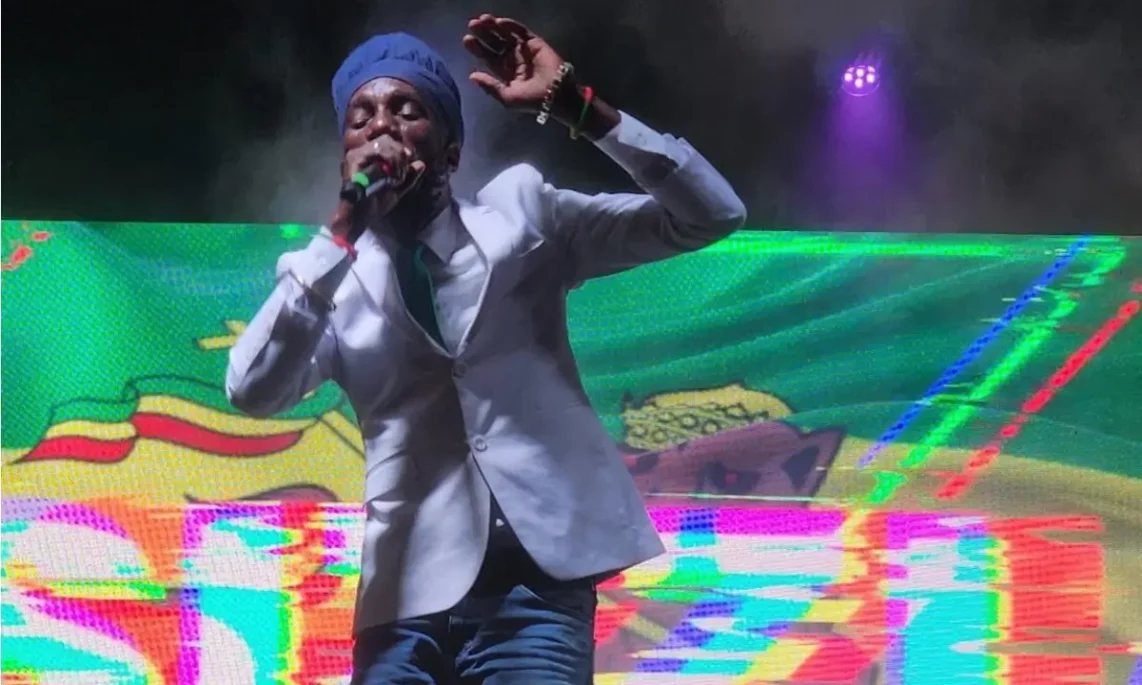‘Have to Stand Up for Something’: Reggae Icon Sizzla Defies Critics of His Controversial Lyrics After First U.S. Show Since Visa Reissuance
A metro Atlanta city boomed with the vibrant sounds of reggae as Sizzla Kalonji hit the stage for his first performance in the U.S. in five years, bringing an energy that was reciprocated by hundreds of fans who packed the grounds of a venue called Zion Yard.
The name of the venue is appropriate for the return of the music icon whose extended discography fuses Jamaican and African culture, which is synonymous with the genre of reggae music.
Born Miguel Collins, the devoted Rastafarian walks onto the stage singing one of his numerous hits that includes chants that reflect his Bobo Shanti upbringing in Jamaica. Without being prompted, the crowd sings in unison with every lyric naturally evolving into a chorus as concertgoers anticipate what track the singer will perform next.
Some concertgoers can’t stay on task with the lyrics because the rhythm of the music has possessed their feet and arms as they jump, wave and sway to the sounds. Others smile and gaze, enjoying the vibe of the reggae artiste as he works the stage and engages the excited crowd.
At one point, an eager fan unknowingly emptied his drink onto this reporter’s dress as he focused on the stage, enjoying every moment of the live performance, oblivious to her presence and that of others.
“Big up all my fans, them. Big up all the beautiful people,” Sizzla says to the crowd.
Recently having his U.S. visa and work permit reinstated after being revoked over a decade ago, Sizzla promised the audience that he would perform as many shows as possible “until his visa runs out.”
According to the U.S. Department of State’s Bureau of Consular Affairs, Jamaicans can obtain U.S. visas that are valid for up to five years. Reports show that Sizzla traveled through temporary visitor visas after the revocation in 2010.
The “Give Me a Try” singer, who has collaborated with American talents like DJ Khaled and Rihanna, was able to regain his visa with the help of his management team. Overjoyed with the victory that will bring new opportunities, the Rasta, who often keeps his nearly ankle-length locs in a turban, says he is not fazed each time he travels and is targeted by airport security for “random searches,” telling Atlanta Black Star that the workers often turn out to be fans.
“It feels good to be away from home, and it feels to be back at home,” Sizzla told Atlanta Black Star before stepping on stage for the May 17 performance in Lithonia, Georgia.
Although it’s unclear why Sizzla’s visa was revoked along with a group of other Jamaican dancehall and reggae stars that same year, the singer has debunked rumors that it had anything to do with his lyrics that are critical of the LGBT community, Jamaica Star reports.
And even though Sizzla told Atlanta Black that he “felt no pressure at all” to be more politically correct in his music, the performer notably did not sing the lyrics to one of his more controversial songs, “Nah Apologise,” during the Atlanta-area performance.
In the mid-2000s, he was named in a campaign by U.S. and European LGBT activists launched against performers whom they claim incited hate crimes, and over the past decade, a number of Sizzla’s shows were canceled following outcry from the LGBT community.
However, the devoted Rastafarian said the backlash makes him “even more confident in doing” his “work.”
“You have to stand up for something, or you’ll fall for nothing, and in this, I’m educating the people and keeping them in the acknowledgment and acceptance of their culture,” he told Atlanta Black Star. “You can’t allow the critiques of others to detour you from a path given to you by the Most High.”
Along with his conscious lyrics and high-energy performances, Sizzla is known to be one of the most commercially acclaimed reggae artists, with a record of 50 studio albums.
Since the release of his debut album, “Burning Up,” in 1995, the process for promoting and selling music has changed because of the digital age.
“The impact is huge because people then usually faced a lot of difficulties in getting a song or an album from CDs or vinyl, but now you have much easier access based upon online social media outlets, and it’s even so helpful in promoting your brand,” Sizzla said. “It’s two different things being promoted at the same time equally, based on the new technology being brought into play for the business of music.”
Fans can expect more performances throughout the U.S. in the coming months and a new album soon, which the reggae icon has already started recording and accumulating tracks.
“We just have fun with things and move by,” Sizzla said, referencing putting his visa troubles behind him.
“We bring a vibe to the place and time. That’s what we’re here for,” he added.

